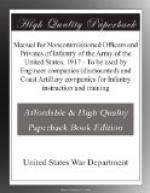Association with lewd women is dangerous. It may result in disabling you for life. It is the cause of a disease (syphilis) which may be transmitted by a parent to his children. Soldiers with venereal diseases should not use basins or toilet articles used by others, as the germs of these diseases if gotten into the eye very often cause blindness. Likewise, if they use the same drinking cup used by others they may give others the disease. They should promptly report their trouble to the surgeon, that they may receive the best medical advice and attention.
Should a soldier expose himself to infection by having intercourse with an unknown woman, he should report as soon as possible afterwards to the regimental infirmary for prophylactic treatment, which, if taken within a few hours after intercourse, will prevent to a large degree the liability of contracting any disease.
Cooked germs are dead and therefore harmless. Water, even when clear, may be alive with deadly germs. Therefore, when the conditions are such that the commanding officer orders all drinking water to be boiled, be careful to live up to this order.
Use the latrines and don’t go elsewhere to relieve yourself. In open latrines cover your deposit with dirt, as it breeds files and may also be full of germs.
Flies carry germs from one place to another. Therefore see that your food and mess kit are protected from them.
All slops find scraps of food scattered about camp soon produce bad odors and draw flies. Therefore do your part toward keeping the camp free from disease by carefully depositing such refuse in the pits or cans used for this purpose.
Urinate only in the latrines, or in the cans set out for this purpose, never on the ground around camp, because it not only causes bad smells but urine sometimes contains the germs of “catching” diseases.
Soapy water thrown on the ground soon produces bad odors. Therefore in camps of several days’ duration this water should be thrown in covered pits or in cans used for this purpose.
As certain mosquitoes can transmit malaria and yellow fever, use your mosquito bar for this reason as well as for personal comfort.
Keep your mouth clean by brushing your teeth once or twice a day. It helps to prevent the teeth from decaying. Decayed teeth cause toothache. They also lead one to swallow food without properly chewing it, and this leads to stomach troubles of various kinds. Food left around and between the teeth is bad for the teeth and forms good breeding places for germs.
Keep the skin clean. Through the pores of the skin the body gets rid of much waste and poisonous matter. Therefore remove this and keep the pores open by bathing once every day, if possible. If water is scarce, rub the body over with a wet towel. If no water is at hand, take a dry rub. Wash carefully the armpits, between the legs, and under the foreskin, as this will prevent chafing.




